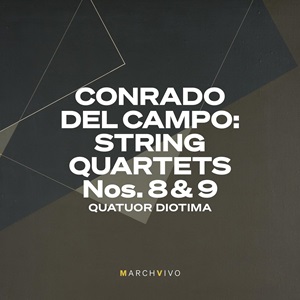
Conrado del Campo (1878–1953)
String Quartet No 8 “A la muerte de su madre” (1913)
Intermezzo-Scherzo sobre el appelido “Mi-la-nes” (1941)
String Quartet No 9 “Apasionado” (1942)
Diotima Quartet
rec. 2022 & 2024, Fundación Juan March, Madrid, Spain
MarchVivo MV011 [2 CDs: 90]
No picture postcard exotica a la española here. These string quartets by the Spanish composer Conrado del Campo betray little of their composer’s nationality. Richly polyphonic and chromatic, spangled occasionally with intervals of tonal instability, they would have graced the pens of Ysaÿe or Max von Schillings. Slightly younger than his better-known contemporary countryman, Manuel de Falla, Campo was an autodidact of donnish inclinations who became an educational institute unto himself in early 20th-century Spain. He remained a steadfast adherent of post-Wagnerianism his whole life, an idiom which, in concert music at least, had long been démodé by the time of his death in 1953.
The Eighth Quartet, like the seven that preceded it, had been composed for Campo’s own French Quartet, although it was not performed until 2013, a full century after its completion. Its programmatic subtitle—“On the Death of the Composer’s Mother”—implies a work rent by grief, or perhaps akin to the mood of filial gratitude and regret that pervades the old Larenza/Bayardo song “Mamá vieja”. Campo’s music, instead, is surprisingly perfervid. “But no! Surrendering to memories is to give one’s self voluptuously into the arms of death”, he wrote of the quartet’s finale, before continuing with words that could just as well be the motto for the whole work: “Let memories serve as a stimulus to stir ever greater the enthusiasm, the energy, the thirst to live!”
A rising dotted motif played in tutti launches the first movement, which eventually gives way to an argumentative development that concludes indeterminately. Highly stylized touches of local colour characterize the scherzo that follows, with outer sections framing a trio based on a Basque folk melody that has a transient resemblance to “Mentre l’erbetta” from the Stravinsky/Pergolesi Pulcinella. The slow third movement bares this quartet’s beating heart; its essential dolour expressed with manly command withal, making all the more poignant the final measures of music that drift away heavenwards. (How strange that this moment immediately recalled to me a particular verse from “Mamá vieja”, which had yet to be written for another few decades at the time Campo composed his quartet: “Yo sé que por las noches/desde una estrella me mira/usted se fue para el cielo/y mi alma llora y suspira” (I know that at night/from a star you watch over me/you went to heaven/and my soul weeps and sighs).) A syncopated motif jolts the finale at its start, sporadically blackening its landscape, yet this is quickly surmounted in an ecstatic embrace of life whose scope by the coda verges on the symphonic.
Despite a caesura of nearly thirty years between the Eighth and Ninth Quartets, their stylistic unanimity is virtually seamless. It was nicknamed “Apasionado” by one of Campos’ students; ebullience and amiability temper its namesake emotion, whose source seems to spring from the “thirst to live” of its antecedent. Even the “Elegy” is wistful, rather than mournful, streaked by sunlight which bursts forth with dazzling radiance in the finale.
Between these quartets is the Intermezzo-Scherzo sobre el apellido “Mi-la-nes”, a delightful piece whose charm obscures its unhappy origin as a song of gratitude to the British Consul in Madrid, John H. Milanes, for rescuing the composer’s son from jail during the Spanish Civil War.
Stylistically conservative music, then, but this descriptor should not be misunderstood as a polite euphemism for “mediocre”. These works are sumptuous, well-crafted, and distinctive. Campos has a great friend here in the Diotimas, whose ardent playing makes an impassioned case for welcoming him into the quartet canon.
Néstor Castiglione
Buying this recording via a link below generates revenue for MWI and helps us keep free access to the site



















